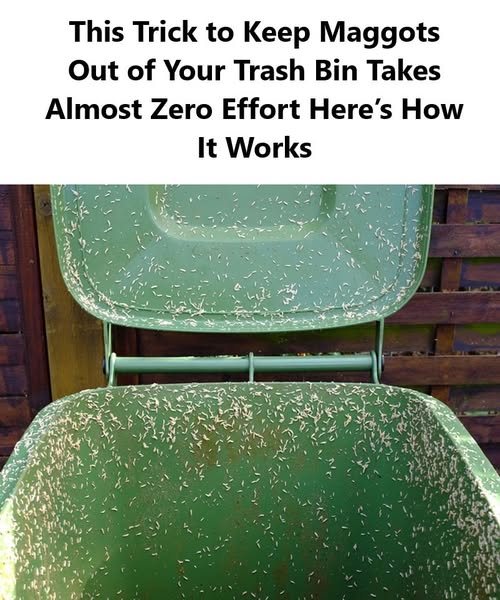ADVERTISEMENT
**Maggots in the Trash Bin? Here’s How to Prevent Them**
When the weather warms up, and your trash bins are left outside for an extended period, the last thing you want is to find maggots crawling inside them. While maggots themselves aren’t harmful in the short term, they are a sign of poor sanitation and an indication that your waste management habits might need some attention. Not to mention, they can be a major nuisance and cause some serious disgust.
Maggots are the larval form of flies, particularly the common housefly (Musca domestica). These flies are attracted to food waste, decaying organic matter, and garbage. Once they lay their eggs in the trash, they hatch into maggots, which can quickly infest your trash can. Dealing with maggots is not only a gross experience, but it can also be a health concern, as it could lead to contamination, unpleasant odors, and an overall unsanitary environment.
Fortunately, preventing maggots in your trash bin is relatively easy, and with a few simple changes to your waste management routine, you can avoid dealing with them altogether. In this article, we’ll discuss everything you need to know about preventing maggots, including what attracts them, how to eliminate them, and tips for keeping your trash bin maggot-free.
### Understanding Why Maggots Appear in Your Trash Bin
Before we get into the solutions, it’s important to understand why maggots are attracted to your trash bin in the first place. Knowing their habits and the conditions that lead to their infestation will help you take preventive measures that are more effective.
Maggots begin as eggs laid by adult flies. These flies are drawn to organic waste and decomposing food in your trash. When food scraps, especially meat or dairy, are thrown away without proper disposal, they emit odors that attract flies from nearby areas. Once the flies detect these smells, they lay their eggs in the trash, typically on food scraps, food packaging, or other organic materials. The eggs hatch within hours, and the larvae (maggots) begin to feast on the organic matter, causing them to multiply quickly.
Several factors contribute to maggot infestations:
1. **Warm Weather**: Flies thrive in warm conditions. If the weather is hot, it speeds up the growth process of maggots. In higher temperatures, maggot infestations can develop faster, and you’ll be more likely to encounter them in your trash bin.
2. **Exposed Organic Waste**: Food scraps, especially greasy or odorous waste, are a magnet for flies. The more exposed food waste you have in your bin, the higher the likelihood that maggots will appear.
3. **Improper Waste Storage**: If your trash bin is not sealed tightly or is left uncovered for long periods, it provides easy access for flies to lay their eggs. A poorly sealed trash bin allows flies to get inside easily.
4. **Long Trash Collection Intervals**: If your trash bin isn’t collected regularly, waste will accumulate and begin to decompose. This creates the perfect breeding ground for flies and, by extension, maggots.
5. **Decomposing Organic Matter**: Rotting food is particularly attractive to flies. If food waste is left in your trash for an extended period, especially in warm weather, it will start to decompose, providing the ideal environment for flies to lay their eggs.
### How to Prevent Maggots in Your Trash Bin
Now that we understand what causes maggots in trash bins, let’s dive into how you can prevent them. Prevention is key, as once maggots have infested your trash bin, it can be difficult to eliminate them. Luckily, there are several methods you can adopt to ensure your trash remains maggot-free.
#### 1. **Seal Your Trash Properly**
One of the most effective ways to prevent maggots from infesting your trash bin is to ensure that it is sealed tightly. Flies need access to the trash in order to lay their eggs. A well-sealed trash bin will prevent flies from getting inside. If your bin has a lid, make sure it fits securely and is not damaged. It’s a good idea to inspect the lid of your trash bin regularly to ensure there are no cracks or holes where flies could sneak in.
If you find that the lid is not sealing properly, consider purchasing a new trash bin or investing in a better-quality one. There are also bins with fly-proof or tightly sealed lids designed to keep flies out.
#### 2. **Use Trash Bags and Double-Bag If Necessary**
Using trash bags is another great way to prevent maggots. Trash bags not only help contain odors but also ensure that food scraps are sealed away. When you dispose of food waste, always use a sturdy trash bag and tie it tightly to prevent any contents from spilling out. This minimizes the chances of flies coming into contact with exposed food waste.
For particularly smelly or wet food scraps, consider double-bagging. For example, if you’re discarding meat or greasy food, double-bagging ensures that the strong odors don’t attract flies. Additionally, double-bagging ensures that there is an extra layer of protection to prevent flies from laying eggs on the waste inside.
For Complete Cooking STEPS Please Head On Over To Next Page Or Open button (>) and don’t forget to SHARE with your Facebook friends
